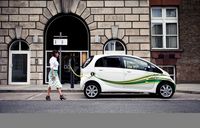Mitsubishi : Electric Vehicle Drivers Enjoy Increased Confidence And Low 'Refuelling' Costs
CIRENCESTER, UNITED KINGDOM – October 11, 2010: The second results of a UK-wide electric and low carbon vehicle testing project are published today. The West Midlands-based CABLED project reports six months into the year-long trial of 25 Mitsubishi i-MiEVs (Mitsubishi innovative Electric Vehicles).
The latest research from the UK’s largest study into long-term low
carbon vehicle use reveals:
Six months into a year-long trial, CABLED (Coventry and Birmingham Low Emission Demonstrators) drivers are travelling more miles, more frequently and are making longer journeys1 - indicating increased confidence and notably reduced range anxiety.
Cost conscious prospective EV drivers may also be interested to learn that the cost for those recharging at home has been on average between just 25p and £1 per day.
CABLED is the largest of eight public trials taking place in the UK as part of The Technology Strategy Board’s £25m Ultra Low Carbon demonstrator programme, with the West Midlands consortium contributing 110 of the 350 vehicles trialled on the UKs roads.
The data2, analysed by Aston University combines and compares the behaviour patterns of 25 Mitsubishi i-MiEV drivers over two consecutive quarters. Brian Price, Aston University comments: “Collecting real-world usage of electric vehicles (EV) through our satellite mapping and analysis has been essential in understanding actual demands and requirements of EV vehicles for consumers. The journey data gathered is already showing that the current generation of ultra-low carbon vehicles are cheap to run as well as being comparable to petrol & diesel vehicles for speed, ease of use and daily journey distance; using less than 30% of total charge in typical daily use. The next phase of the study will allow us to map out an optimal charging point network to further extend range and improve the convenience of electric cars.
Project Leader Neil Butcher from the co-ordinating partner Arup explains the data presents a positive outlook for the mass take-up of EVs. “The phenomenon known as ‘range anxiety’ - concern about battery life when undertaking long journeys - is falling as drivers become more familiar with their vehicles. The low costs of ‘refuelling’ in relatively short periods of time reinforce this. While there are technical challenges ahead - extending vehicle range and preparing for increased demands on the national grid - our results show that even current vehicles are more than capable of meeting users’ day-to-day needs3.”
CABLED is one of several Government measures designed to increase the number of low carbon vehicles on Britain’s roads. Transport Secretary, Philip Hammond, recently reiterated the current government’s commitment to this work by investing an additional £24 million in to further developing the UK's low carbon vehicle capability.
Reflecting on the findings and the implications for vehicle manufacturers, Mitsubishi Motors’ managing director Lance Bradley added: “Finding that drivers quickly adapt to electric vehicles is good news for the car industry, which is currently investing heavily in the development of low carbon vehicle technologies.
“The findings indicate that drivers habitually charge their vehicles, whether the battery is half full or nearly empty, in much the same way as a laptop or mobile phone, which will influence the next generation of battery technology that is incorporated into these vehicles.”
The CABLED results show that the average charge time per charge is just less than two hours, with a typical energy transfer of 4-8kWh costing between 40p and £1 depending on the tariff and providing sufficient charge for 20-40 miles of travel. Averaged out across a week, daily use is roughly the equivalent of doing one load of washing in a washer dryer.
Charging data such as this helps inform the development of energy infrastructure and Smart Grid technology, in-line with driver needs, as Charles Bradshaw-Smith, head of group E-Mobility R&D at E.ON, says: “Meters installed at each user’s home are giving us invaluable information on behavioural trends.
“The most popular time to charge vehicles is overnight but, since most journeys are relatively short, five average length journeys can be completed on one charge. This is evidence to support the need for intelligent charging technology that will allow EVs to interact with the distribution grid – an area in which E.ON is researching into.
“The goal is to allow drivers to take advantage of low cost energy whilst enabling EVs to both draw and feed into the grid in order to smooth demand peaks and troughs.”
In summary Arup’s Neil Butcher said: “We learn more with each fresh set of data and as the rest of the 110 CABLED drivers take to the roads in coming months, our findings will form part of the largest study of low carbon vehicle use ever compiled. Indications of driver confidence will also be a lot clearer following the publication of the third and fourth quarter results, which will allow us to look at the influence of seasonal changes on driver behaviour.”



